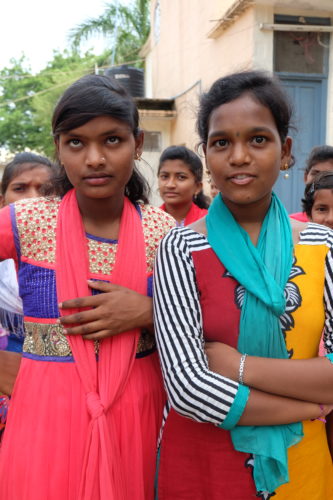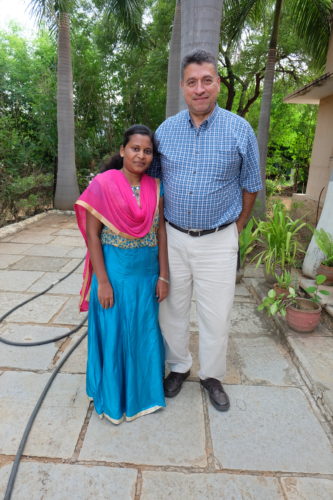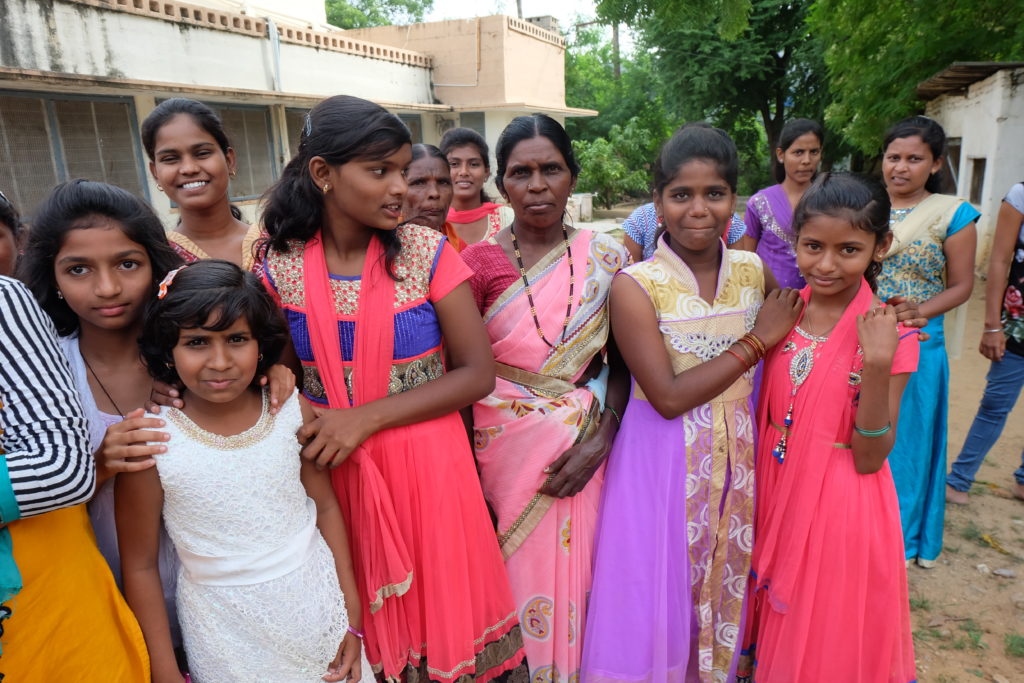When Luis Bourdet, Children Incorporated Director of International Programs, and I left the Chandrakal Methodist Boarding Home to visit the Lou Ann Long Girls’ Hostel on our second day in India, I was just starting to get an understanding of what poverty looks like for children in the country. The Chandrakal Methodist Boarding Home, although older and lacking in funds, is providing for hundreds of students coming from poor farming communities – kids who otherwise would not go to school. The children face a lot of barriers when it comes to getting an education; but thankfully, many of them are being supported by sponsors who can help them overcome adversity.

Without help from their sponsors, girls in rural India would not get an education.
But what we had seen during our first project visit would be very different from what we would see during our second, a couple of hours away from Hyderabad, the capital city of Telangana, in a smaller town called Yadgir, situated in an even more rural part of India. Lining the roads we traveled, among tiny, one-room brick shacks, were tent communities of tribes of Indians who are not provided with government housing, and who have no choice but to squat on land as they look for seasonal farm work.
These laborers are the poorest of the poor, making only about forty cents a day; and because of their dire economic situation, many of their children are malnourished. Not only can they not afford to send their children to school, but they also can’t afford to feed them.
Older buildings aren’t safe for kids
Children Incorporated has been affiliated with the Lou Ann Long Girls’ Hostel for a long time, although our Volunteer Coordinator, Premalatha, a deaconess with the Methodist Church, is new to the project. Like the Chandrakal Methodist Boarding Home, the hostel is also supported by the Methodist Church.
When we arrived an hour and a half after leaving Chandrakal, we pulled into a dirt driveway lined with tall trees that cast shadows across the property. Overgrown plants and brush covered the grounds. The compound wasn’t large, but it had enough room for the children to spread out in grassy areas among the buildings and trees.
These laborers are the poorest of the poor, making only about forty cents a day; and because of their dire economic situation, many of their children are malnourished.
We parked outside the main building, the house occupied by Premalatha and her family. Adjacent to their dwelling was the girls’ dorm, which was built about seven years ago, thanks to funding from Children Incorporated supporters. I was already starting to see a pattern in India within our projects – of the two projects we had visited so far, both had benefited immensely from funds from our donors for the construction of new structures.
Another less fortunate similarity to the Chandrakal Methodist Boarding Home was that the other buildings on the property were very run down but still being used, if for nothing more than storage. Some of the buildings were so dilapidated that they didn’t look safe to enter; and again, I thought it seemed as though they should be demolished.
We met with the 35 girls who live in the home, all of whom are enrolled in our program, outside their dorm. Ranging in age from five to nineteen years, the girls attend local schools located only a short walk from the hostel. Premalatha explained that the parents don’t pay anything for the girls to stay at the hostel, because they are so poor and have no money to contribute. She said that it’s tough for her to make ends meet at the hostel because outside of support from the Church and Children Incorporated, they don’t receive any government funding or help from other non-governmental organizations.
Excelling despite difficulties

Luis Bourdet poses with Sita, who is working towards a Master’s Degree in Social Work.
After we met the children, we toured a large building behind Premalatha’s home, where the girls study and pray in the mornings and afternoons. As we were walking to the large main room, I was overwhelmed by such an intense smell of smoke that I had to turn around and go back outside. Come to find out, the kitchen is right next to the study area, and smoke from burning wood had filled the room, making it hard to breathe. Premalatha said she wants to update the kitchen with gas stoves to cut down on the smoke and the need to store wood, but she has no funding for the upgrade.
As Luis and I continued to talk with Premalatha, I learned that the hostel needed more than just an updated kitchen – the girls sleep on the floor and are in need of beds, mattresses, cots, and linens. They also need mosquito nets to make them less susceptible to mosquito-borne illnesses like malaria. The roof was also leaking and in need of patching.
It was apparent that the girls at the Lou Ann Long Girls’ Hostel are really in need – even more so than I had seen of our sponsored children earlier in the day. The project had a desperate feeling to it, but I knew that Premalatha and the other administrators are working hard to try to improve the lives of these girls, who otherwise would not be getting an education, and maybe not even eating, if they were still living with their parents. And the administrators’ hard work was paying off: despite the difficulties they face, the girls are excelling academically.
Before we left, we met with a girl named Sita who has graduated from high school and finished her undergraduate studies, and is now studying to get her Master’s Degree in Social Work, thanks to the help she is receiving from her sponsor. It was great to meet her, and feel a glimmer of hope for these girls. She is a shining example of the power of sponsorship, and the ability for children to excel even when extreme poverty threatens to hold them back.
***
HOW DO I SPONSOR A CHILD IN INDIA?
You can sponsor a child in India in one of three ways: call our office at 1-800-538-5381 and speak with one of our staff members; email us at sponsorship@children-inc.org; or go online to our donation portal, create an account, and search for a child in India that is available for sponsorship.

